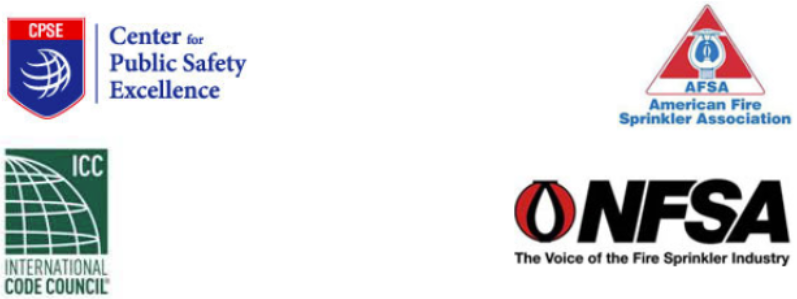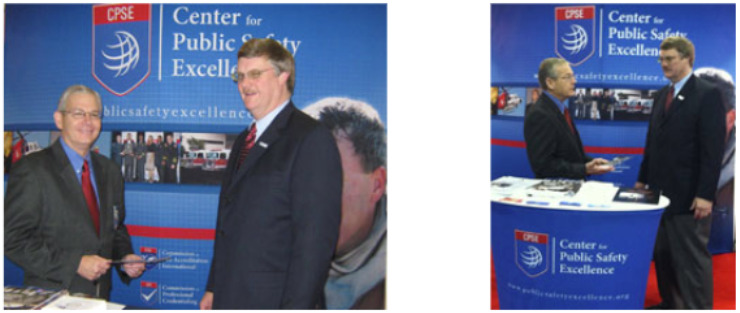
Residential Fire Sprinkler Installer Accreditation Enters Beta Phase

![]() Fire Chief Randy Bruegman, President of the Center for Public Safety Excellence, Inc. (CPSE) announced from Fire Rescue International in Atlanta, GA., the beta testing phase for the development of accreditation for residential dwelling fire sprinkler installers. In his announcement Chief Bruegman said, “I would like to commend the hard work that has been put into this process by all the representative groups to date. The importance of identifying and assuring the competencies of installers of residential dwelling sprinkler systems is of paramount importance to the future success of the wide spread application of this life saving technology. We are excited to see this work continue into the beta testing phase and look forward to bringing this work to a successful conclusion in the near future.”
Fire Chief Randy Bruegman, President of the Center for Public Safety Excellence, Inc. (CPSE) announced from Fire Rescue International in Atlanta, GA., the beta testing phase for the development of accreditation for residential dwelling fire sprinkler installers. In his announcement Chief Bruegman said, “I would like to commend the hard work that has been put into this process by all the representative groups to date. The importance of identifying and assuring the competencies of installers of residential dwelling sprinkler systems is of paramount importance to the future success of the wide spread application of this life saving technology. We are excited to see this work continue into the beta testing phase and look forward to bringing this work to a successful conclusion in the near future.”
CPSE’s partners in the development of the accreditation are actively engaged in the Technical Advisory Committee (TAC) charged with building the model and process. Phillip A. Brown, SET, CFPS, and the Director of Technical Program Development & Codes for the American Fire Sprinkler Association, capturing the importance of the beta phase for the TAC states, “As a contractor-based organization, it has been very important for the American Fire Sprinkler Association to offer common-sense ideas on critical competencies. While much has been accomplished, AFSA is hopeful that the beta-testing process will further identify areas of improvement. It is important to devise an accreditation program that is meaningful and useful rather than rush to a final program that will not be effective or accepted.” Jim Dalton, National Fire Sprinkler Association Liaison to the Accreditation (Technical) Advisory Committee added, “Having spent the past year working with our principle partners and other stakeholders on the development of an Accreditation Program for installers of one and two-family fire sprinkler systems, we are confident that, after a suitable period of Beta Testing in the field, we will be prepared to introduce a national program that gives the consumer, the Authority Having Jurisdiction and Public Policy Representative a high level of confidence in these most important life safety systems.”
Jay Peters, ICC Executive Director, PMG, summed up the sentiments of the TAC as the partners and members look forward to the beta phase and beyond. “ICC is extremely pleased with the progress of the Technical Advisory Committee and for the dedication of all the stakeholders that have created a consensus recommendation for the essential accreditation criteria. The diversity of organizations participating in the Technical Advisory Committee will help ensure market acceptance of this accreditation model. We look forward to the beta test and the roll-out of the program after approval by the CPSE Accreditation Commission.”
In August 2010, the Center for Public Safety Excellence, American Fire Sprinkler Association, National Fire Sprinkler Association and the ICC signed an MOU creating a partnership to promote installation of residential dwelling sprinkler systems and to develop a new accreditation program for installers of residential dwelling fire sprinkler systems. CPSE, the accrediting organization, created a Technical Advisory Committee to develop and recommend to its Board of Directors the accreditation model to include competencies, application and review processes, and general guidelines for the new program. The TAC met in person in November of 2010 and July of 2011 and has held several web meetings resulting in the creation of the criteria and competencies, and draft documents and guidelines for the application and review process. After an “alpha” review by the members of the TAC, the model has been moved to the beta phase for field testing and feedback from actual installers. Beta participants are being selected by the principal trade associations serving on the TAC. The beta phase will begin immediately and the TAC final recommendations are expected to be presented to the CPSE Board of Directors in December of 2011.
 CPSE provides communities, agencies, and individuals with methods, processes, and research to enable the fire and emergency profession to continuously improve services, resulting in a higher quality of life for their constituents.
CPSE provides communities, agencies, and individuals with methods, processes, and research to enable the fire and emergency profession to continuously improve services, resulting in a higher quality of life for their constituents.









